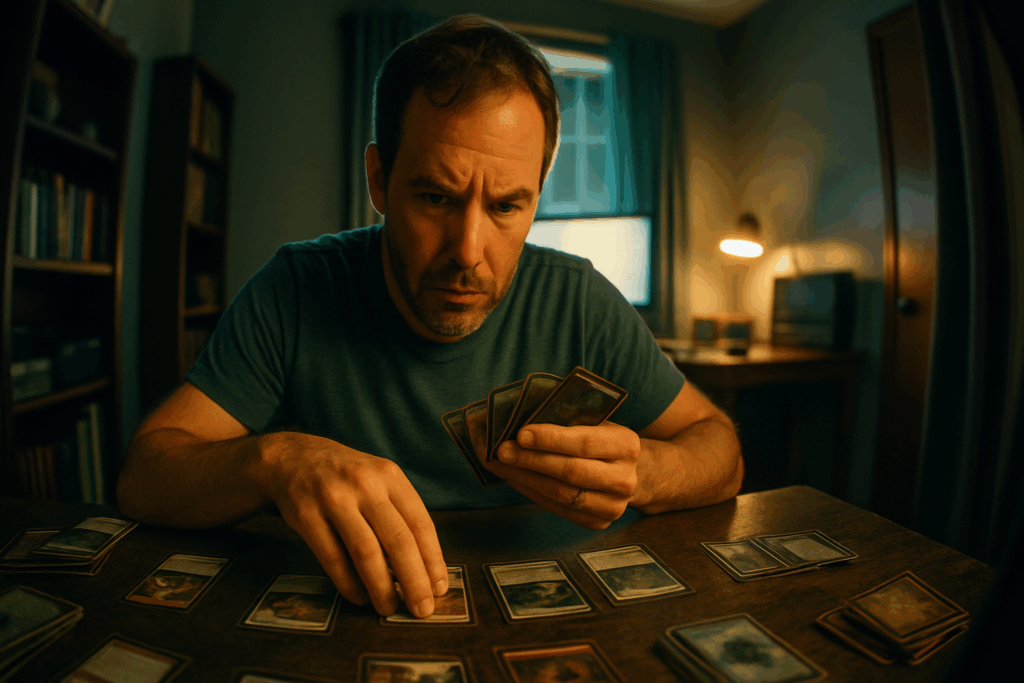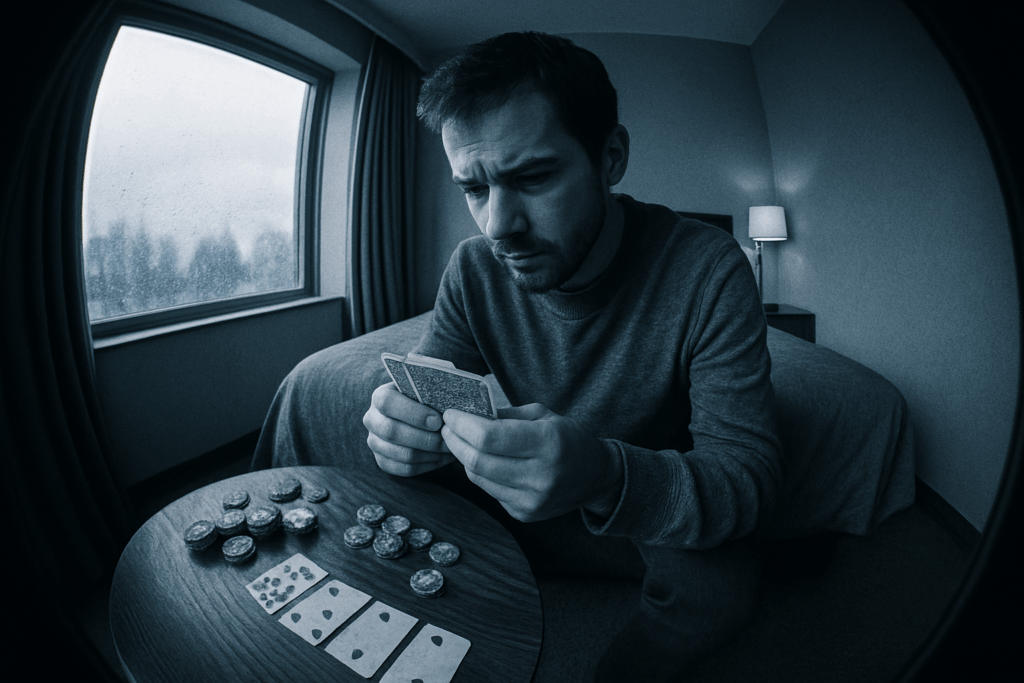What Is the House Edge?
Understanding the “house edge” is the first step to gambling smarter. It’s not complicated—but it’s crucial if you want to play with your eyes open rather than relying on luck alone.
Quick Definition
The house edge is the built-in advantage that a casino has on any given game. It’s expressed as a percentage that represents the average amount the casino expects to win from each bet in the long run.
- For example: If a game has a house edge of 5%, the casino expects to make $5 for every $100 wagered over time.
Why Every Casino Game Has a House Edge
No matter how the game looks or feels, every casino game is designed to generate profit. That doesn’t mean you can’t win, but the odds are always tilted—subtly or strongly—in the casino’s favor.
- Games are not built on fairness between you and the house
- Casino profits depend on mathematically guaranteed margins
This edge is what keeps casinos in business, even when they occasionally pay out huge jackpots.
The Math Behind the Edge
The house edge isn’t about a single hand, spin, or bet—it’s about the long-term average. The more you play, the more the mathematical advantage of the house comes into play.
- In roulette, a single-zero European wheel has a house edge of 2.7%, while an American wheel (with 0 and 00) climbs to 5.26%
- Slot machines can range drastically, with house edges from 2% to over 10%, depending on the game
Even small percentages matter. Over hours or days of play, that difference can add up to hundreds or even thousands of dollars.
Bottom line: The house edge ensures that, over time, the house always wins—not always immediately, but predictably over the long haul.
How House Edge Affects Your Gameplay
The house edge sounds small—2%, 5%, maybe even 10%. But over time, those tiny numbers crush your bankroll. A slot machine with a 5% edge means that for every $100 you bet, you’ll lose $5 on average. Now stretch that over hundreds of spins or hands. It adds up fast.
Let’s break it down:
- Most slot machines have a house edge ranging from 4% to 10%. Flashy? Yes. Smart bet? Not really.
- American roulette has a house edge of 5.26%, thanks to that double zero.
- European roulette trims that to 2.70% by dropping the second zero.
- Blackjack—if played with basic strategy—can have a house edge as low as 0.5%.
When you play games with a lower edge, you’re not just gambling—you’re giving yourself a shot. Blackjack stands out because skill and basic strategy narrow the gap. It’s not a guaranteed win, but it’s a fairer fight.
Bottom line: house edge isn’t just a stat, it’s the difference between fun money and burnt money. Choose wisely and understand what those percentages mean for your time at the table.
Common Myths About House Edge
“The casino doesn’t always win.” Technically true. But also misleading.
Anyone can win on a spin, a hand, or even walk away up for the night. That’s luck. What the house counts on isn’t your loss today—it’s your loss eventually. The house edge is baked into every game. It’s not about each play but about volume. Given enough time and enough bets, the math works in the casino’s favor.
Where most players trip up is misunderstanding randomness. You win three times in a row? That’s a streak, not a pattern. Random events don’t self-correct. A roulette ball landing on red five times doesn’t mean black is “due.” There’s no memory in games of chance. Each round is fresh, untouched by the last.
Then there’s the lure of betting systems. Martingale, Fibonacci, Paroli—you name it. All claim to beat the house by shifting the way you bet. But these systems only tweak how long you stay afloat, not the outcome. Eventually, you hit a table limit or drain your bankroll before the math catches up. The edge remains, untouched, no matter how clever your system sounds.
Bottom line: the casino doesn’t always win in the short run—but in the long run, it never loses.
Choosing Games That Work for You
Not all casino games are built the same. Some bleed your bankroll faster than others, and it all comes down to the house edge. The lower it is, the longer your money lasts—and the better your odds of leaving ahead (or at least not drained).
Start by spotting games with proven low house edges. Blackjack, when played with basic strategy, can dip under 1%. Baccarat and some bets in craps also offer more favorable odds. Avoid games where the house edge climbs over 5%, like keno or many slot machines. Flashy lights don’t equal fair odds.
Skill-based games usually work better for serious players. Games like blackjack or video poker reward strategy. In contrast, pure luck games—think roulette or slots—leave everything up to chance. That’s not always a bad thing, but know which you’re walking into. If you’re not learning or improving, you’re likely just feeding the system.
Bankroll strategy matters more than people think. If you play long enough, the house edge will grind you down—that’s math, not pessimism. So think in sessions, not marathons. Set limits, track your bets, and walk when the numbers say so. The goal isn’t to beat the system overnight. It’s to play smart and play long enough to enjoy the ride.
Knowing where the edge lives isn’t just trivia. It’s survival.
Strategies to Minimize the House Edge
You can’t eliminate the house edge—but you can chip away at its advantage by playing smart. First step: know your game. Whether it’s blackjack, video poker, or craps, basic strategy makes a difference. It’s not flashy, but a player who understands odds and plays by the book loses slower—and sometimes even walks away ahead.
Next, stop ignoring the extras. Bonuses, comps, loyalty perks—they’re not just fluff. If a casino offers you money to play, use it. But use it wisely. Read the terms, know the rollover rules, and don’t chase losses trying to unlock a bonus. Treat comps like cash-back for disciplined play, not reasons to overplay.
And maybe most overlooked: walk away. The longer you play, the closer you get to the house pulling ahead. Fatigue sets in, and tilt is real. Know your limit—set one before you start—and stick to it. Win or lose, stepping away clear-headed beats grinding out hours until the edge catches up.
Want a more detailed breakdown? Check out Top Strategies for Winning at Blackjack.
Final Takeaway: Play Smart, Not Reckless
Walking away up a few hundred bucks might feel like beating the system—but if you don’t understand how the house edge works, that win could be short-lived. Casinos aren’t built on single wins; they thrive on long-term math. The more you play without a plan, the more you’re playing into their hands.
This doesn’t mean you shouldn’t enjoy the game. Just go in with your eyes open. Know what you’re playing, why you’re playing it, and what the realistic outcomes are. The house edge isn’t your enemy—it’s just the rules of the arena. Once you know the rules, you can choose where and how to play with purpose.
Smart players stay informed. They pick games where the math isn’t stacked too steeply. They track time, manage money, and quit before chasing losses turns into a death spiral. In short: understand the edge, respect its impact, and play the game on your own terms. That’s how you walk out with more than just a story.


